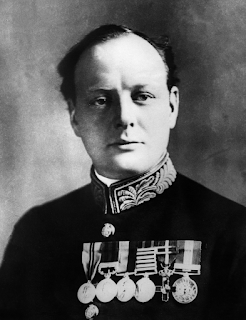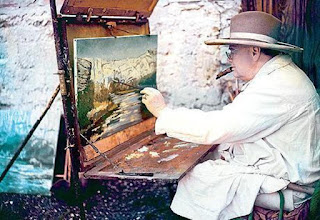The Other Club
 |
Churchill in 1912; shortly after
founding the Other Club |
Founded in 1764 by the artist Joshua Reynolds and the essayist Samuel Johnson, the Club was to be "composed of the heads of every liberal and literary profession" and "have somebody to refer to in our doubts and discussions, by whose Science we might be enlightened," as a later member Charles Burney put it. Churchill and Smith were insulted when they were rejected, but they soon found an effective way to fight fire with fire.
In 1911 Winston Churchill and F. E. Smith founded the Other Club, another fortnightly dining club that was to meet once every fortnight at the Savoy Hotel's Pinafore room. The chief difference between the Other Club and the Club was that the Other Club was much more flexible with whom they accepted. The Club seldom accepted those who were not involved in politics, but the Other Club welcomed writers, philosophers, and people who were rejected by the Club. It was originally intended to have twelve MPs from each of the two major political parties as members, but it quickly began accepting those who had nothing to do with politics. The main goal was simply "to dine," as Churchill put it, and the more interesting the people, the better. Churchill and Smith's idea was well received, and famous names like Lloyd George, H. G. Wells, P. G. Wodehouse, Laurence Olivier, and Alfred Munnings often attended.
 |
| The Savoy hotel's Pinafore Room, where the Other Club still meets today. |
- The Club shall be called the Other Club.
- The object of The Other Club is to dine.
- The Club shall consist of no more than fifty Members and not more than twenty-four Members of the House of Commons.
- So long as this number is not exceeded, any Member may propose a Candidate for election to the Committee, and the Committee may circulate the name of any other Candidate or Candidates (but not singly) to the Club for election at such time as they think fit.
- The Club shall dine on alternate Thursdays at 8.15 punctually, when Parliament is in session.
- There shall be an entrance fee of £5 and an annual subscription of £7 10s. £2 shall be charged for each dinner. The Members of the House of Commons shall be paired from 8 o’clock until 10.30 p.m. unless they arrange to the contrary through the co-secretaries.
- The Members of the House of Commons shall be paired from 8 o’clock until 10.30 p.m. unless they arrange to the contrary through the co-secretaries. The Executive Committee shall settle all outstanding questions with plenary powers.
- The Executive Committee shall settle all outstanding questions with plenary powers.
- There shall be no appeal from the decision of the Executive Committee.
- There shall be no appeal from the decision of the Executive Committee.
- The names of the Executive Committee shall be wrapped in impenetrable mystery.
- The Members of the Executive Committee shall nominate the Secretary, who shall receive no remuneration and shall be liable for all unforeseen obligations.
Sources:
"The Other Club" by Wikipedia. en.wikipedia.org/wiki/The_Other_Club
"The Club" by Wikipedia. en.wikipedia.org/wiki/The_Club_(dining_club)
"Winston Churchill in politics, 1900–1939" by Wikipedia. https://en.wikipedia.org/wiki/Winston_Churchill_in_politics,_1900–1939
"The Other Club: Founded by Churchill and F.E. Smith" by Fred Glueckstein. https://winstonchurchill.hillsdale.edu/club-founded-churchill-f-e-smith/
"Rules of the Other Club" by the International Churchill Society. https://winstonchurchill.org/resources/reference/rules-of-the-other-club/
"Churchill Critiques: Changing Parties" by the Churchill Project. https://winstonchurchill.hillsdale.edu/changing-parties/
Young Titan by Michael Shelden.
Churchill: Walking With Destiny by Andrew Roberts.


That is hilarious and fascinating. Sounds like a very eightish thing, to go and start your own club. (:
ReplyDeleteI agree :) It would be fun to join, wouldn't it? imagine going to a club with Winston Churchill and Lloyd George!
ReplyDelete